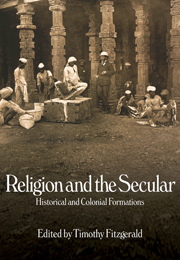Book contents
- Frontmatter
- Dedication
- Contents
- Acknowledgements
- Contributors
- Introduction
- 1 Dialectics of conversion: Las Casas and Maya colonial Congregación
- 2 A higher ground: the secular knowledge of objects of religious devotion
- 3 Secularizing the land: the impact of the Alaskan Native Claims Settlement Act on indigenous understandings of land
- 4 The formative process of State Shinto in relation to the Westernization of Japan: the concept of ‘religion’ and ‘Shinto’
- 5 Religious and secular in the Vietnam War: the emergence of highland ethno-nationalism
- 6 Colonialism all the way down? Religion and the secular in early modern writing on south India
- 7 Understanding politics through performance in colonial and postcolonial India
- 8 Real and imagined: imperial inventions of religion in colonial southern Africa
- 9 Religion in modern Islamic thought and practice
- 10 Rudolf Otto, cultural colonialism and the ‘discovery’ of the holy
- 11 Encompassing Religion, privatized religions and the invention of modern politics
- 12 Colonialism and the myth of religious violence
- Index
3 - Secularizing the land: the impact of the Alaskan Native Claims Settlement Act on indigenous understandings of land
- Frontmatter
- Dedication
- Contents
- Acknowledgements
- Contributors
- Introduction
- 1 Dialectics of conversion: Las Casas and Maya colonial Congregación
- 2 A higher ground: the secular knowledge of objects of religious devotion
- 3 Secularizing the land: the impact of the Alaskan Native Claims Settlement Act on indigenous understandings of land
- 4 The formative process of State Shinto in relation to the Westernization of Japan: the concept of ‘religion’ and ‘Shinto’
- 5 Religious and secular in the Vietnam War: the emergence of highland ethno-nationalism
- 6 Colonialism all the way down? Religion and the secular in early modern writing on south India
- 7 Understanding politics through performance in colonial and postcolonial India
- 8 Real and imagined: imperial inventions of religion in colonial southern Africa
- 9 Religion in modern Islamic thought and practice
- 10 Rudolf Otto, cultural colonialism and the ‘discovery’ of the holy
- 11 Encompassing Religion, privatized religions and the invention of modern politics
- 12 Colonialism and the myth of religious violence
- Index
Summary
The Annual Report for 2002 of the Cook Inlet Region, Inc. (CIRI), an Alaska Native regional corporation created by the Alaska Native Claims Settlement Act of 1971, lists among its investments: the Westin Kierland Resort and Spa in Scottsdale Arizona; partnership in VoiceStream Wireless Corporation and BellSouth Corporation (a communications system operating in major US cities); ownership of multi-tenant business parks in Anchorage and other locations in the lower 48 states (including Miami, Florida and Kent, Washington); venture interests in Peak Oilfield Service Company; partnership in the Ritz-Carlton, Lake Las Vegas luxury resort hotel and full ownership of the Casino MonteLago, which is attached to the Ritz-Carlton Hotel (Cook Inlet Region, Inc. 2003: 11-15). These capital ventures run and operated by a major Alaska Native regional corporation paint a far different picture of the indigenous peoples of the Arctic and sub-Arctic regions of Alaska than are depicted in popularly held stereotypical images, such as those outlined by the Alaskan anthropologist, Wendell Oswalt:
Eskimos are for many reasons the most exotic people in the world. After all, what is more demanding than living in a land where it is nearly always cold? What is more unprecedented than a diet of meat or a house built from snow? What could be kinder than never punishing children or more pacific than being ignorant of war? What is more bizarre than killing one's children or aged parents without showing emotion?
- Type
- Chapter
- Information
- Religion and the SecularHistorical and Colonial Formations, pp. 71 - 92Publisher: Acumen PublishingPrint publication year: 2007



